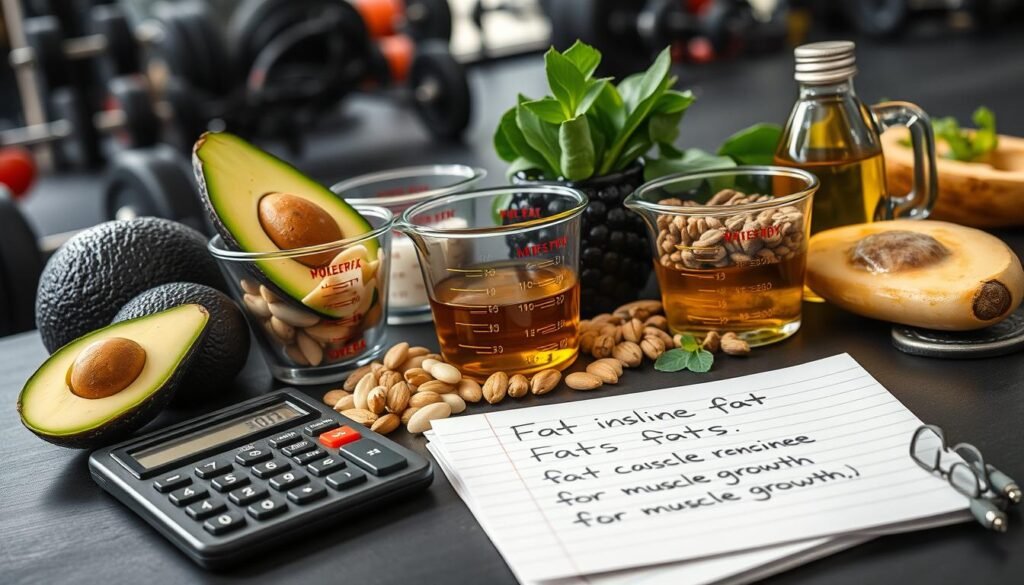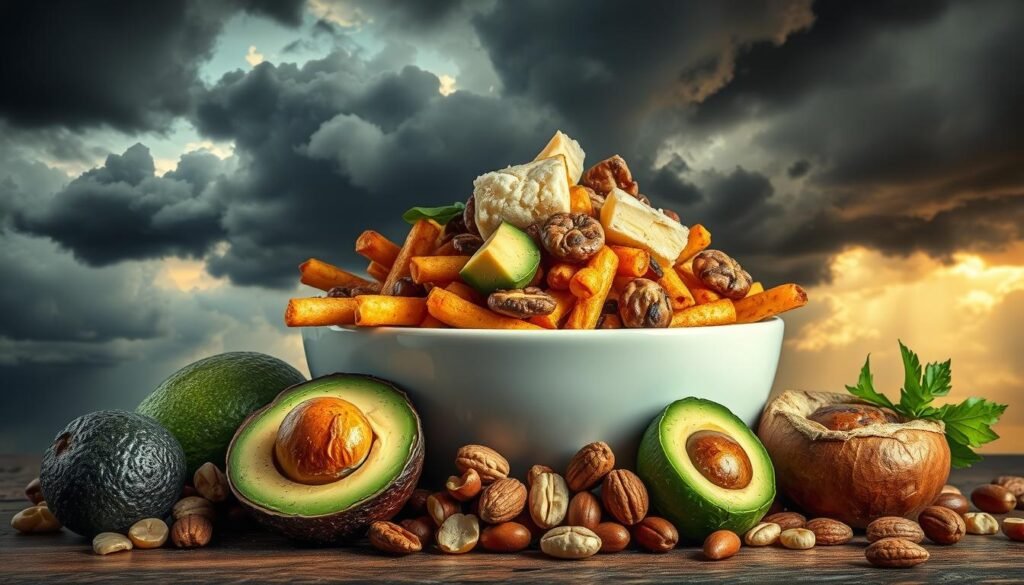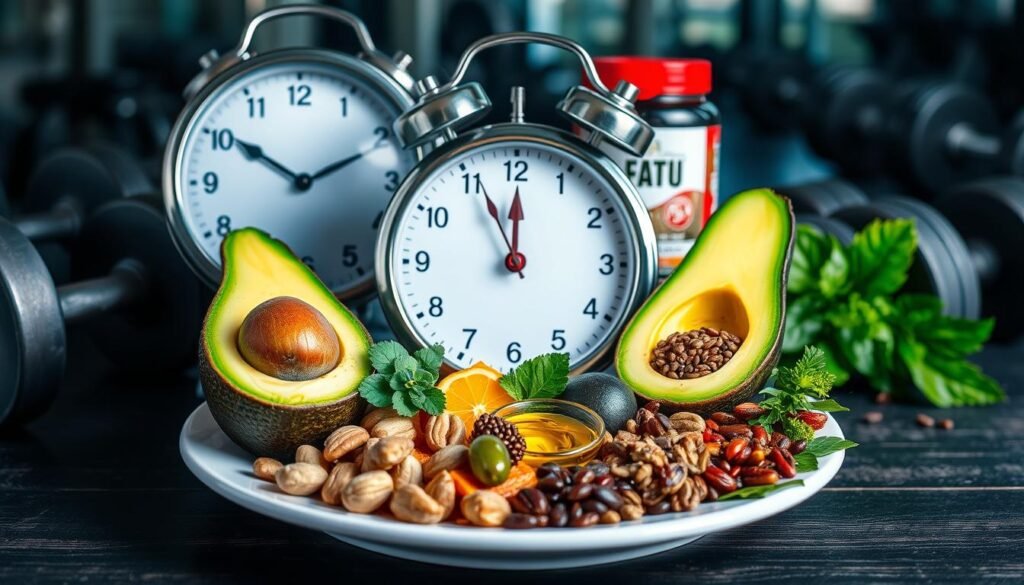About 30-35% of your daily calories should be fats when you’re bulking. These fats aren’t just fuel for muscle growth. They also keep your hormones in check. When gaining muscle is your goal, knowing how fats affect your hormones is key. Even though protein often gets all the attention, fats are just as critical.
Fats play a big role in making hormones that help with muscle recovery and growth. This article will help you pick the right fats for your diet during a bulking phase. By choosing wisely, you can make your journey to more muscle smoother.
- Dietary fats should comprise 30-35% of daily calories in a bulking diet.
- Healthy fats support hormonal health and recovery essential for muscle growth.
- Balancing macronutrients effectively enhances muscle protein synthesis.
- Incorporating nutritious fats can help avoid excessive fat deposition during bulking.
- Understanding types of fats is crucial in optimizing muscle growth.
The Importance of Dietary Fats During a Bulk
The journey of muscle growth during a bulk relies a lot on importance of dietary fats. These fats are a rich source of calories. They play a key part in getting a caloric surplus. Aiming for about 20–30% of total calories from fats each day is advised. This helps keep energy levels up for tough workouts. When starting a bulking diet, it’s vital to balance macros well. This balance fuels workouts and helps with muscle recovery.
Adding healthy fats aids in muscle build and keeps fat gain low during bulking. Bodybuilders usually eat about 3800 kcal/day in their off-season, focusing on macros for better muscle recovery and growth. Enough fat is key for metabolism and top athletic performance.
Fats, when used wisely, improve muscle growth and make workouts more effective. For more on mass-gaining diets, check this analysis. It covers how fat intake and muscle building are connected.
Understanding Hormonal Health
Hormonal health is key when you’re really into bodybuilding and strength training. Hormones control metabolism, energy, and muscle growth. Getting the right hormone balance boosts performance and overall health.
If you want muscles to recover and grow, you need more anabolic hormones like testosterone and growth hormone. Compared to catabolic hormones such as cortisol. Testosterone ramps up muscle mass, strength, and helps with fat. It’s also good for libido and bones, vital for fitness fans.
Growth hormone helps build muscle and strengthens the body while cutting fat. Insulin is crucial too, pushing nutrients into muscles and aiding tissue repair. Your diet and exercise impact insulin levels. Growth factors push muscle growth, speed up recovery, and melt fat, all key for effective workouts.
But cortisol, which stress triggers, can hurt muscle growth by tearing down tissue, especially if your blood sugar is low. Keep stress low and workouts short to fight off cortisol’s bad vibes.
Eating right plays a big role in hormonal health. Try having protein post-workout, eat fewer carbs, and keep your blood sugar even during exercise. These steps can boost your hormone balance.
Your lifestyle, like how well you sleep and when you exercise, also changes hormone levels. Watching these areas helps you stay on course for top-notch performance and hormonal health.
Fats for Hormonal Health and Muscle Growth During a Bulk
Choosing the right fats is key for those looking to grow muscles while bulking. Healthy fats are important for hormone regulation. This affects how the body uses nutrients and builds muscle. Eating these fats helps with hormones that improve recovery and gym performance.
How Fats Support Hormone Regulation
Fats are crucial for hormone health, aiding in the creation of hormones like testosterone and estrogen. These are important for muscle growth. Eating the right fats keeps hormone levels balanced, helping your body to build muscle. They can also lower cortisol, a hormone that can prevent muscle growth if too high.
Examples of Healthy Fats
Adding a mix of healthy fats to your diet can boost your results. Some good choices include:
- Avocados
- Olive oil
- Nuts and seeds
- Fatty fish like salmon and mackerel
These foods offer essential fatty acids and support immune and metabolic health. This adds more benefits to muscle building. For a detailed look at macronutrients and muscle growth, see this resource. It’s also important to know about keeping muscle mass during breaks in training. Find out more here.
Healthy Fats to Include in Your Bulking Diet
Adding healthy fats into your bulking diet is essential for muscle growth and hormonal health. These fats are not just important for calories. They also play a big part in how well you feel overall. Knowing about the different fats can help you choose the right foods.
Monounsaturated Fats
Monounsaturated fats are important for a healthy eating plan, especially when bulking up. You can find these fats in olive oil, avocados, and nut butter. They are great for your heart and help produce hormones. This makes them perfect for anyone trying to grow muscles while keeping hormones in check.
Omega-3 Fatty Acids
Omega-3 fatty acids are key nutrients for bulking up. They are mainly in fatty fish like salmon and mackerel, and also in flaxseeds. These fats help lower inflammation and aid in recovery. By including omega-3s in your diet, you ensure your body is ready to build muscle effectively.
Sources of Essential Fatty Acids
Essential fatty acids are vital for things like cell health and hormone balance. Since our bodies can’t make these acids, we need to get them from food. The best sources include flaxseeds, walnuts, and chia seeds. Eating these foods improves hormonal health and boosts overall wellness.
| Type of Fat | Sources | Benefits |
|---|---|---|
| Monounsaturated Fats | Olive oil, avocados, nuts | Improve heart health, support hormone production |
| Omega-3 Fatty Acids | Fatty fish, flaxseeds, walnuts | Reduce inflammation, promote recovery |
| Essential Fatty Acids | Chia seeds, hemp seeds, soybeans | Support cellular function, maintain hormonal balance |
The Role of Fats in Muscle Anabolism
Fats play a key role in building muscle and boosting performance. They give us lots of energy for hard workouts. Fats also help muscles recover after we exercise.
Eating healthy fats is important for absorbing vitamins that repair and grow muscles. For those trying to bulk up, getting enough fats is crucial. Healthy fats in post-workout meals improve recovery and help muscles grow over time.
Good nutrition involves balancing proteins, carbs, and fats for better muscle growth. Picking the right fats and knowing how much to eat can boost recovery and growth. Omega-3 fatty acids, monounsaturated fats, and sources of essential fatty acids offer big benefits for muscle growth.
Calculating Your Fat Intake for Muscle Growth
Understanding how to calculate fat intake is key for bulking up the right way. It’s crucial to be in a caloric surplus for muscle growth but avoid too much fat. First, find out your maintenance calories. This depends on your weight, how active you are, and your goals. After that, add 10-20% more calories to this number for muscle gains.
Determining Caloric Surplus
Figuring out your caloric surplus is easy. Just use the Basal Metabolic Rate (BMR) formula and pick the right activity level multipliers. For someone moderately active, adding 300-500 calories on top of your maintenance will help muscle growth. This way, there’s plenty of energy for workouts and to recover after.
Distribution of Macronutrients
After you know your surplus, think about macronutrient distribution. Make sure healthy fats are 20-30% of your total calories. So, if you need 3,000 calories each day after your surplus, get 600 to 900 of those calories from fats. That’s about 67 to 100 grams daily. This helps your muscles grow and keeps your hormones balanced and energy up.

For good health, eat foods rich in healthy fats like avocados, nuts, and fatty fish. They’re not only packed with calories but also have essential fatty acids for your well-being. For more tips on fixing muscle imbalances and developing a balanced body, check out this useful guide.
How to Easily Incorporate Fats into Meals
Adding fats to daily meals can boost nutrition and help muscle growth. By smart meal planning, you can include healthy fats without losing taste or diet quality.
Meal Planning with Healthy Fats
Try to mix in different healthy fats when you plan meals. Avocado, nuts, seeds, and olive oil are great. They make food richer. For example, olive oil on roasted veggies adds flavor and helps you absorb more nutrients. This way, you keep your fat intake in check with your goals.
Snack Ideas Rich in Fats
Snacking is a chance to add more healthy fats during the day. Here are some fat-rich snacks:
- Handful of mixed nuts
- Sliced apple or banana with almond or peanut butter
- Cheese cubes and whole-grain crackers
- Hummus with carrot and cucumber sticks
These snacks are tasty and help you reach your calorie and nutrient targets when bulking up. Planning meals is key to diet success.
Potential Pitfalls of Excessive Fat Consumption
Eating fats is key in a bulking diet, but too much can be a problem. Gaining extra weight is a risk if you don’t watch calories. Since fats are high in calories, it’s easy to eat too much without noticing.
This can lead to gaining unwanted fat. It is important to understand this to keep fit.
Understanding Caloric Density
Fats are the most calorie-dense nutrients, providing about 9 calories per gram. Even a small amount of nuts or avocados can add a lot of calories. This is great for gaining, but you must be careful not to overeat.
It’s crucial to watch how much you eat. Knowing how much calories fats have helps manage your diet better.
Avoiding Unhealthy Fats
It’s important to choose the right fats for health. Bad fats, like those in processed or fried foods, can harm your health. They don’t help with muscle growth or hormone balance.
Stick to whole foods like olive oil, avocados, and nuts. This helps avoid the downsides of too much fat. It ensures fats work for your fitness goals, not against them.

Optimizing Testosterone Levels with Dietary Fats
Dietary fats are key to boosting testosterone, which is vital for muscle growth and health. Adding healthy fats to your diet can really ramp up testosterone production and keep hormones balanced. It’s important to balance both micro and macro nutrients to get these benefits.
The Connection Between Fats and Testosterone
Studies show dropping fat intake from 40% to 25% lowers testosterone significantly. This includes a cut in saturated fats and an increase in polyunsaturated ones. Yet, eating fats rich in omega-3 can help avoid these drops. Foods like red meat and shellfish are great because they’re packed with zinc, crucial for making testosterone. Learning about the link between fats and testosterone helps athletes eat better for improved performance.
Micro and Macro Nutrient Balance
Getting the right mix of micro and macro nutrients is key for testosterone. Different foods affect testosterone in different ways. For example:
| Nutrient | Impact on Testosterone |
|---|---|
| Zinc | It’s vital for making testosterone; not enough means lower levels. |
| Magnesium | Boosts testosterone; taking more can help raise levels. |
| Vitamin D | Lacking it can drop testosterone; taking more helps if you’re low. |
| Healthy Fats | They keep hormones in check, important for producing and keeping testosterone. |
In short, paying attention to fats and nutrients is key for good testosterone levels. This not only helps build muscle but keeps you healthy too. Knowing how to balance your nutrients can make your training more effective. A good plan for nutrients supports hormone levels vital for athletes.
Timing Your Fat Intake for Maximum Muscle Growth
Timing your fat intake is key to muscle growth, especially for bulkers. Eating fats at the right times can boost your energy during workouts and help you recover after. Eating healthy fats with carbs before exercising gives you long-lasting energy for tough workouts.
After working out, mixing fats and carbs helps with recovery. Healthy fats can slow digestion, yet moderate amounts before or after exercise improves nutrient uptake. This careful fat intake boosts muscle growth and ensures great performance and recovery.

| Timing Fat Intake | Before Workout | After Workout |
|---|---|---|
| Purpose | Provide energy | Aid recovery |
| Recommended Pairing | With carbohydrates | With proteins |
| Impact on Performance | Enhances endurance | Supports muscle repair |
| Ideal Sources | Nuts, avocados | Oils, fatty fish |
Knowing how to time your fat intake can lead to better muscle growth. It creates a diet that supplements your overall nutrient timing. This approach changes how you bulk up, improving both your performance and muscle build.
Conclusion
Choosing the right fats is key for muscle growth and hormone health during a bulk. Fats help with nutrient absorption and regulate key hormones. These affect energy, recovery, and performance.
Adding healthy fats to a bulking diet is crucial for muscle building. Hormones like insulin and testosterone are linked to muscle recovery and growth. The impact of dietary choices on these hormones is crucial. For more insights, check out this article for strategies on dietary fats.
A balanced approach, including fats, nutrition, and exercise, boosts fitness goals. Understanding how these elements interact leads to continuous progress and better health outcomes.